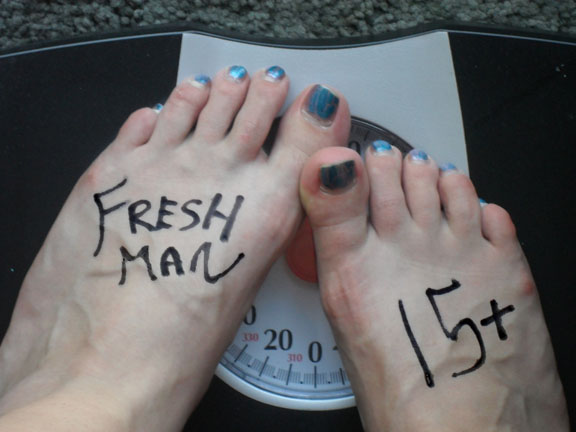You’ve all heard of it, dreaded it, and probably been told that it will ‘round out’ your college experience. Upperclassmen swear that weight gain is unavoidable as the typical freshman watches the scale climb from 5, 10, 15, topping 50 pounds over their starting college weight.
What is it about dorm food that is so appealing? The variety of foods you have available in the buffet lines? The unmistakable quality of university board costs? The sheer mass of quantity of food swirling around the dining hall?
With the fall semester days to hours away, it’s no wonder everyone’s running to the latest fad or diet advice. But you don’t need a rigorous exercise regimen or a crazy, fad diet. With simple preventative measures, you will never need to worry about gaining any freshman, sophomore, et al 15.
1. Eat What You Need, Not What You See
I know your dorm offers barbeque, sandwiches, pizza, burgers, Mexican, Italian and salad. But do you really need all of that on your tray? The biggest problem transitioning from high school to college life is portion size.
In high school, they glopped food—if you could call it that—into tiny squares for you to nibble at before you gave up and tossed it. Now, you have real, if not much better, food and an endless supply of trays, plates, bowls, you name it.
You control what and how much you put on your plate.
If one plate of food could get you through dinner at home, why can’t one plate at college? Of course, it isn’t just what you serve yourself, but when you serve it.
2. “Hitting the Books” does not mean, “Ordering a Pizza”
The most important thing is not how much or even exactly what you eat; it’s when you eat it. There’s a chemical explanation with melatonin levels effecting weight loss and eating habits, etc. But to be honest, do you need every scientist in the world to tell you that eating a pizza at 1 a.m. followed by Red Bull is bad for your body? No.
Don’t eat after 10:30, if you can help it.
If you really need a kick, move around! You will be surprised by how much more energy you have from moving. The adrenaline in your body will keep you twice as awake as any shot of caffeine from soda, energy drinks or coffee. And if it doesn’t, it means that your body is too tired for that. So get to sleep. Speaking of which—
3. Stop Studying and Hit The Sack
Remember the melatonin levels I mentioned above? They’re back!
The more sleep you get the less likely you are to gain the freshman 15.
For one, you aren’t eating! When you stay up later, you order pizza and soda: empty calories that your body cannot use to repair muscle tissue, bone loss and repair cells. And when is the only time your body gets a chance to do this? During sleep. Sleeping is also the body’s only real way of recuperating with stress.
College being more stressful is a given. Sometimes you can barely think with classes scattered about campus, extracurriculars and work. And that is exactly it. The more you feel stressed out, the more you need to sleep. Just like your mind likes to relax when it’s awake—reading a book, getting a massage, working out—your brain needs to repair the body and detoxify itself. If it can’t do this, fat stores inside your body and builds up. Chemicals that you have ingested throughout the day also begin to build and cause weight gain. One of the worst contributors to your body? Diet soda.
4. Skip the Diet.
All the Flavor! Zero Calories! Sugar supplements are the worst thing you could put in your body. Sugar is a natural forming sweetener. Your body knows how to process, use and burn it as fuel.
Artificial sweeteners cannot be processed by your body and burned; they get automatically stored as fat; avoid them!
Drink real soda. Yes, you’ll be consuming calories. Calories that your body needs to think. Zero Calories = Zero Concentration. Aspartame, a leading ingredient in many diet sodas has been linked to dizziness, headaches, and even memory loss. Don’t you have enough to be worrying about at university?
5. Increase Your Curb Appeal
One of the best things you can do for your body is to get moving. Moving your muscles releases those built-up toxins and eases the strain on your joints and tendons. The easiest and cheapest way to get your body out there? Walking.
When you move to university, especially if it’s out of state, it’s tempting to drive your car just about everywhere. On bigger campuses, where parking is limited, having a car suddenly makes you the most popular person on campus! However, driving (or riding in a motor vehicle) is a major reason why college students gain the Freshman 15.
All around campus, dozens of students take the free public transportation to and from class. Now, if you have 10 minutes to get to your next class and it’s a 5-minute bus ride or 30-minute walk, I completely understand. When your class is less than five blocks away, it’s simple to walk and much easier than confining yourself to a busy, won’t wait for you, bus schedule.
Walking to class should be the only exercise you truly need to keep the freshman 15 at bay.
On large campuses where hills, rivers, and streets stand in between your dorm and your class, walking is essential to maintaining your weight in an environment surrounded by bars, pizza parlors and endless dorm food. On smaller campuses, it’s even easier to walk. Believe me, walking might be the only reason I curbed the freshman 15 all year.
Even with all this in mind, it’s pretty understandable how people gain the freshman 15. People generally try to be good—ordering diet soda, sticking to a couple of items on their plate—without realizing diet soda is harmful and French fries are not acceptable as a vegetable. Additionally, it’s the one, two, or three times they order that pizza. It’s the late nights getting no sleep downing energy drinks.
But you don’t have to be one of them. Control your portions, watch what you eat, get enough rest and walk. I didn’t gain the Freshman 15. Neither will you!
 Lauryn Ash is currently a second year, sophomore at the University of Iowa in Iowa City, studying English and International Studies. During the school year, she is a volunteer/intern for ICFRC/CIVIC, an NGO dedicated to bringing international issues along with international visitors into Iowa City and Eastern Iowa. When she’s not watching Doctor Who or Sherlock, she’s either studying, writing, or blogging at laurynash.wordpress.com.
Lauryn Ash is currently a second year, sophomore at the University of Iowa in Iowa City, studying English and International Studies. During the school year, she is a volunteer/intern for ICFRC/CIVIC, an NGO dedicated to bringing international issues along with international visitors into Iowa City and Eastern Iowa. When she’s not watching Doctor Who or Sherlock, she’s either studying, writing, or blogging at laurynash.wordpress.com.

